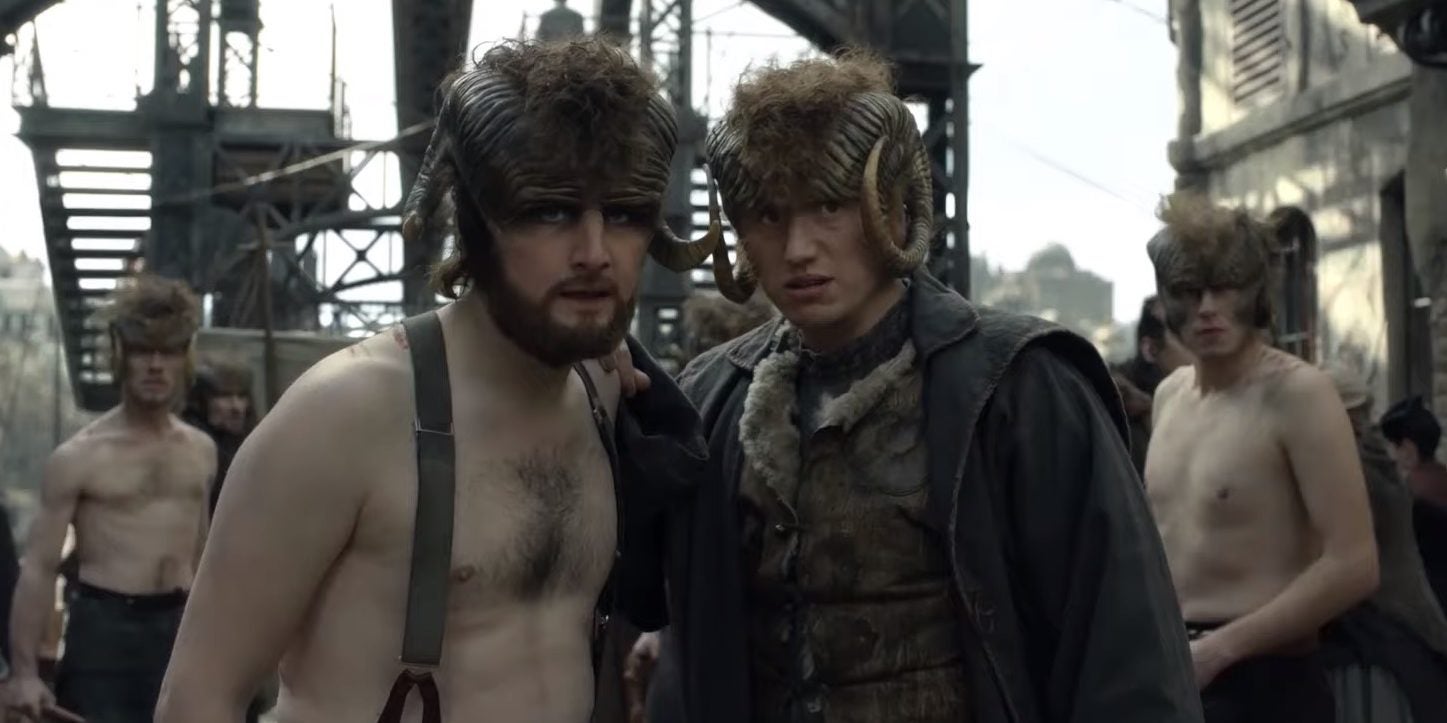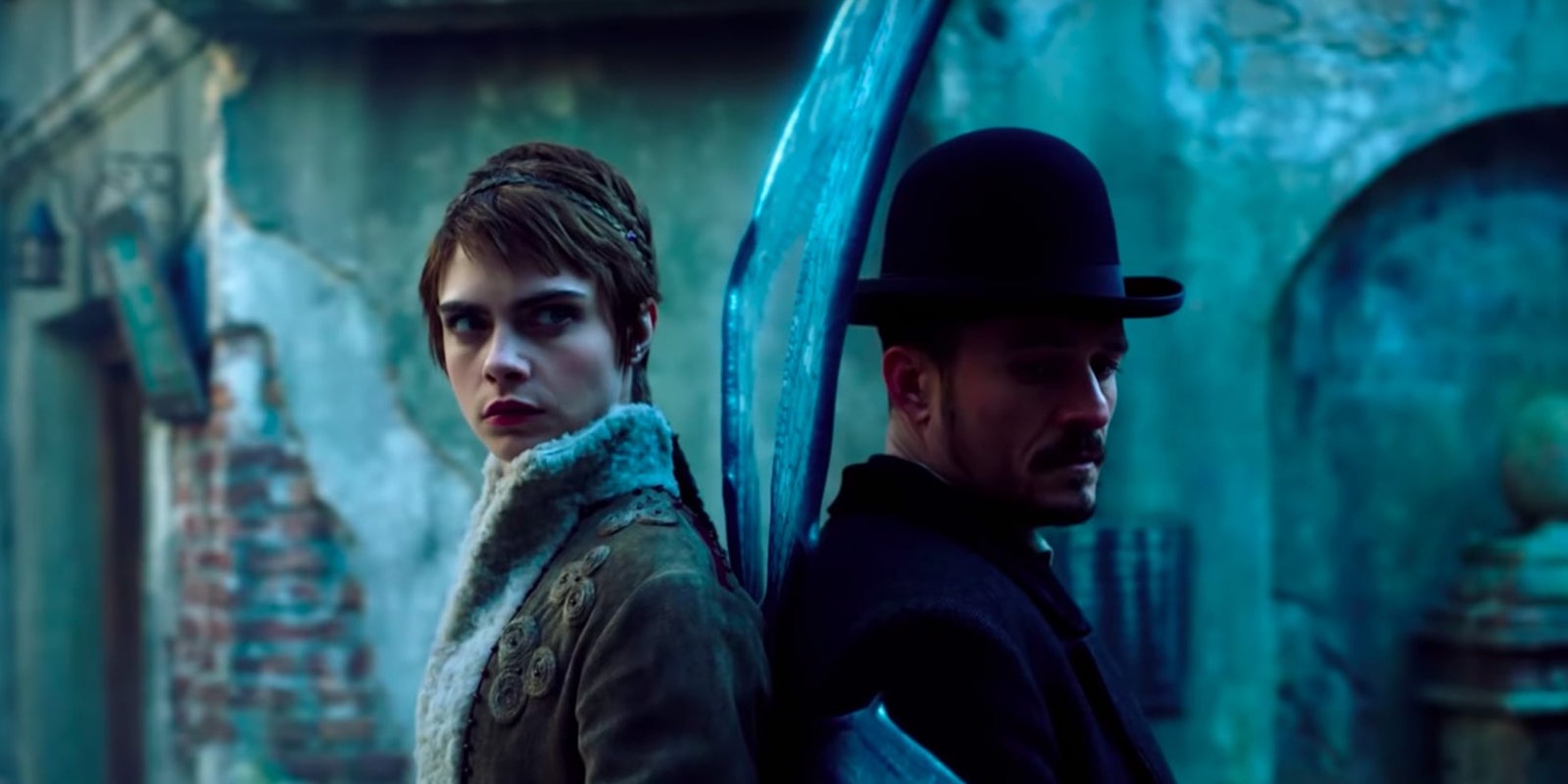To make Carnival Row, Amazon poured a dazzling amount of money into a dubious idea with a cringeworthy script. Like Netflix’s critically derided Will Smith vehicle Bright, this eight-episode series is a racism allegory about fantasy creatures being oppressed by humankind. Set in a quasi-Victorian city, the show manages to be both shallow and overly complicated in its world-building.

DIRECTOR: Jon Amiel
STREAMING: Amazon Prime
This cliched, humorless urban fantasy uses magical creatures as a clumsy allegory for racism.
The Fae (most of whom are denoted by wings or horns) are refugees from an overseas war, traveling to the majority-human city of the Burgh to find shelter. Constantly beset by discrimination and abuse, most join the criminal underclass or work as indentured laborers. Episode 1 also introduces a Fae-hating Jack the Ripper analogue called Unseelie Jack, who murders Fae women while a human detective, Rycroft “Philo” Philostrate (Orlando Bloom), investigates. Naturally, there’s a scene where Philo and another man exchange exposition over a woman’s naked corpse. Featuring gory disembowelment and the obligatory historical-fantasy brothel scenes, Carnival Row is adult-rated but thematically childish.
Writer/creator Travis Beacham has an unmatched talent for character names, as proven by his work on Pacific Rim. Here, he’s unleashed the most self-indulgent fantasy names you’ll find on TV, including co-protagonist Vignette Stonemoss (Cara Delevingne) and supporting characters such as Imogen Spurnrose, Absalom Breakspear, and Portia Fyfe. The names are so delicious that I hoped this would be a kind of Jupiter Ascending for urban fantasy, appealing to people who read Holly Black and Tamora Pierce books as tweens. Unfortunately, Carnival Row is sexist and generally ill-conceived, so it probably won’t retain its potential target audience of female fantasy fans who loved Orlando Bloom in his mid-2000s heyday.

The gulf in quality between Carnival Row’s writing and visual execution is stunning. With luxurious production values, its crowd scenes and urban set pieces rival Harry Potter’s. All the costumes and interior sets are gorgeous, but when the characters actually open their mouths, the problems begin. The dialogue is riddled with cliches and totally humorless to boot. Competent direction (Jon Amiel) and a respectable cast (including British TV stars Jared Harris and Indira Varma) elevate the source material, but only just.
Bloom, a charming actor with great comic timing, did not get a single joke in the four episodes I endured for this review. Philo has the overall vibe of a generic video game protagonist: an unshaven guy in his mid-thirties with a tragic backstory and a desire for justice. The plot sort of pushes him in the right direction to solve crimes, without him exhibiting any real detective skills. What’s more, he only gets limited fight scenes—a real surprise considering Bloom’s extensive experience with historical combat roles.

Instead, we trudge through a dull crime storyline, intercut with Vignette’s arrival in the Burgh. Now a refugee, she met and fell in love with Philo during the war in her homeland. Believing him dead for the past seven years, she’s shocked to see him alive and working as a cop in the Burgh. In theory, I’d be onboard with this star-crossed romance, especially after (spoiler alert!) the revelation that Philo is a half-blood Fae who passes as human. But the show doesn’t spend enough time exploring why this relationship is so important to them both. Their romance is allegedly the cornerstone of the story, but I just don’t buy it, despite Bloom’s skill for looking soulfully into women’s eyes.
READ MORE:
- Pennyworth offers a delirious alt-history prequel to the Batman franchise
- Why Black Sails is the rightful successor to Game of Thrones
- The Terror: Infamy delivers a chilling mix of history and horror
Originally pitching Carnival Row as a film in 2005, Travis Beacham finally developed it into a TV series more than a decade later. The political allegory is meant to be current and hard-hitting, but it somehow still feels like a 15-year-old idea, revived by the generous budgets of the streaming wars. Considering how hard it is for original ideas to get the same funding as adaptations like Watchmen and Lord of the Rings, it’s kind of depressing that this was the result.

Yes, this is a story about refugees being exploited by a bigoted and patriarchal empire. But it’s also a show where most of the key characters are white, and where Bloom’s derivative hero is consistently portrayed as the center of the universe. Again and again, female characters—in one case a hate crime victim—ask Philo to open up about his troubles, or go out of their way to say he’s “a good man.” (Naturally, women are always keen to hear about men’s problems, especially cops.) He’s a textbook white savior, even if his identity in the show is analogous to being biracial. Between him and Vignette combined, you get maybe a quarter of the personality you’ll find in any main character in Game of Thrones’ pilot episode.
Why are so many fantasy writers obsessed with faux-Victorian settings? This one feels especially lazy: a smoky, bustling city full of people with British accents, where the Fae represent cultures exploited by the British Empire, women are second-class citizens, and everyone is ruled by a parliament of old, white men. Viewers are bombarded by heavy-handed depictions of anti-Fae racism, yet Philo is the only character who seems to fight back.
Like some other racism-allegory dramas I’ve seen (Altered Carbon and Blade Runner 2049 come to mind), Carnival Row erases the concept of “real” racism so it can focus on the supernatural stuff. This would be fine if the show actually did it properly, with diverse casting across the board. But while Carnival Row removes explicit bigotry between humans, it still clearly takes place in a white-dominated society, where the vast majority of authority figures are white men. This comes across as an afterthought, while sexism is central to Travis Beacham’s Victorian fantasy vision. Wealthy human women quietly manipulate the society their husbands and fathers control, while poor and/or Fae women are sex workers, servants, criminals, and murder victims. Given free rein to create a fantasy universe, why not employ a truly diverse cast and present women as equals?
Even if you can overlook the dodgy politics, Carnival Row suffers from a deeper problem: It’s not entertaining. I went in with the best possible attitude, and I’m the ideal audience: someone who enjoys urban fantasy, loves to watch rooftop chase scenes, and is fully onboard for an Orlando Bloom renaissance. When the show was first announced, I laughed delightedly on Twitter at the OTT character names. But as it turns out, the names are probably the best part, followed by the production design and music (composed by Nathan Barr). Based on an underdeveloped idea with two-dimensional characters and shoddy dialogue, Carnival Row fails as a crime drama, a political fantasy, and a love story. In an era with so many expensive, star-studded TV shows, this one just isn’t worth your time—although it’s apparently worth Amazon’s, because they’ve already renewed it for season 2.
Still not sure what to watch on Amazon? Here are the best Amazon originals, the best documentaries on Amazon Prime, what’s new on Amazon, the best 4K movies, Amazon original movies, alien movies, and the sexiest movies you can stream right now.
Looking for something more specific? Here are the best comedies on Amazon Prime when you need a laugh, sad movies to make you cry, kids movies for the whole family, the best thrillers to get your heart racing, and the classic movies on Amazon Prime everyone should see. If that’s not enough, here are the best Amazon Prime channels.


